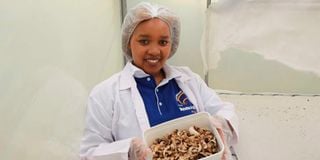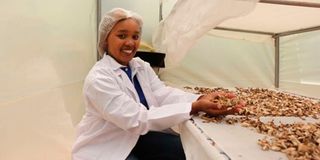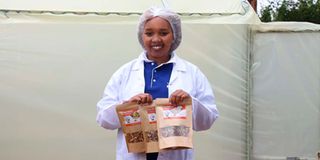Premium
How farmer mills profits from mushrooms

Alice Wamboi at her business premises in Karunga, Kiambu.
What you need to know:
- Alice Wamboi grows, harvests, dries and mills mushrooms for sale in a fast-rising agribusiness.
- Farmer has found Karunga a perfect place to run her mushroom value addition start up.
Situated some two kilometres from Kiambu town, Karunga is one of Nairobi’s “bedrooms”, thanks to its proximity to the city. Thousands of those who live there work in Nairobi, commuting to and fro daily.
Coffee and tea are the main cash crops grown here, but farmers are also embracing pineapples and potatoes.
With its bulging population, Alice Wamboi has found Karunga a perfect place to run her mushroom value addition start up.
Named Mycellia and Foods Limited, Alice processes and packages dried mushrooms for sale.
“I dry and mill two varieties of mushrooms namely button and oyster. I sell to families and traders who blend with other composite flours such as wheat or sorghum," says the agriprenuer, who also owns three mushroom houses at her rural home in Githunguri, each measuring 30 by 15 metres.
While the value addition enterprise is her latest, she has been growing the crop since 2019.
“After spawning (planting), one must ensure that the relative humidity in the house is higher than 90 per cent and 200C temperature is kept constant,” she explains.

Alice Wamboi at her business premises in Karunga, Kiambu.
“This is achieved by misting the mushroom house. After a month of incubation, the mushroom pinheads begin to appear, then harvesting follows soon after,” she adds.
Alice began the value addition business in January after realising that she was making losses by selling fresh produce through an 80-member self-help group she was part of.
"Mushrooms are highly perishable, they cannot last for more than five days. Sadly, once harvested, only 45 per cent make it to the market,” she claims.
To better her value addition business, she enrolled for a six-month product development course at the Kenya Industrial Research and Development Institute (Kirdi), which she is completing in two month’s time.
"Dry mushrooms can stay for long as long as they are not in contact with moisture, and that is why they are becoming a popular delicacy when prepared in soups, roasted, grilled or fried,” she explains.
She pumped into the project more than Sh870,000, a grant from Kenya Climate Innovation Centre and her savings.
The money went on purchasing two solar panels and building the drying chamber, a milling machine and renting a premises in Kiambu town where she processes and packages her products.
From her three mushroom units, Wamboi harvests about 200 punnets every day, which translates to 50 kilos.
She buys more from Mushroom Farmers Self-Help Group at Sh150 for a 250g pack of button variety and oyster at Sh120 for the same pack.
She dries the mushrooms for three days, with 800 kilos of fresh produce giving some 80 kilos of dried produce.
“When the produce is received from farmers, we first sort it, then weigh. Then it is sliced uniformly and spread in the two storey solar dryers. Air is actively extracted from centrifugal fan and redirected to the mushrooms to speed up the drying," she explains.
After three days, Alice normally tests the mushroom for moisture content, that is determined by their crunchiness.
She mills some of the product to make mushroom powder and packages the rest for sale under her brand name Mycellia Foods.
“Lactating mothers, toddlers and the elderly are the biggest consumers of the products as well as traders who go to blend other flours. Mushroom has 60 per cent protein, no cholesterol and is a good source of vitamin B2 and iron,” says Alice, who before getting into the mushroom business worked as a utensils hawker.

Alice Wamboi at her business premises in Karunga, Kiambu.
She sells 100g of dried mushrooms at Sh400, while 40g of mushroom powder at Sh200.
Alice, who is in the process of getting certification of her products and employs two workers, uses social media sites Facebook, Twitter and Instagram to market her products although most of her sales come from referrals from buyers in Kiambu and Nairobi and as far as Malindi Nakuru and Uasin Gishu.
Margaret Kavindu, a food scientist at Jomo Kenyatta University of Agriculture and Technology, says one can prepare various products from mushrooms such as jam, sauce and preservatives, hence one is assured of higher income.
According to her, value addition of mushroom is ideal as it reduces the bulkiness of the produce especially in commercial production.
“Dried mushrooms fetch more in the market compared to fresh produce. But for one to succeed, appropriate training is necessary as this is significant in establishing the right skills on cultivation and marketing strategies.”
Kavindu advises agripreneurs in sector to maintain high standards of hygiene during the value addition process, from drying, chopping, milling to packaging to ensure that their products are fit for human consumption.
"Upon drying, mushrooms should be packaged in an air-tight bag to prevent them from coming into contact with any form of moisture.”
According to her, mushrooms are susceptible to developing moulds and yeast as they easily absorb water from the surrounding environment.





